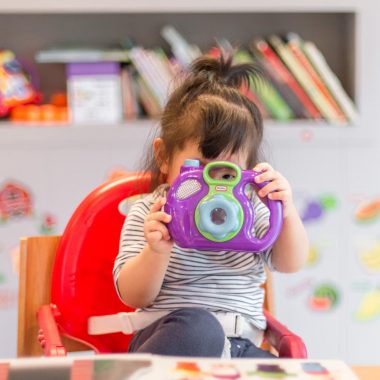As a parent, it’s natural to observe that each child is distinct and progresses at their own pace. However, when it comes to language and communication abilities, you may become worried about your child’s development if you notice variations between them and other children.
It’s entirely typical to compare your child to others, as it can help you identify potential developmental hurdles. However, it’s crucial to obtain accurate information about what qualifies as a challenge or delay.
Speech is the verbal expression of language and includes articulation, which is how we form sounds and words.
Language is about giving and getting information. It’s understanding and being understood through verbal, nonverbal, and written communication.
Basically, speech and language problems are different issues, but they often overlap.
In this article, you will read the difference between speech and language delay, their definitions, and some tips about supporting your child in developing their skills.
What is speech delay?
Speech delay is a developmental delay in which your child appears to be a “late talker.”
In the instance of a speech delay, your child may comprehend your words but struggle with the motor skills required to speak.
Additionally, a child with a speech delay may use words and phrases to convey thoughts, but their speech may be difficult to comprehend.
Research indicates that speech delay is a relatively common developmental issue, with boys being one to four times more likely than girls to experience it.
Signs of speech delay
Common signs of speech delay seen in children include:
- Using a limited number of sounds
- Struggling to link two or more sounds together
- Speech that is unclear and difficult to understand
- Delay in developing specific sounds when pronouncing words
- Struggling to interact and get messages across successfully
- Experiences regular breakdowns or difficulties in communication
- Being frustrated at not being understood
Possible causes of speech delay
A child’s speech delay could indicate a slightly different developmental timeline, with the potential for eventual catch-up. However, it’s also possible that speech or language delays point to underlying difficulties in the child’s physical and intellectual growth.
Various factors could be involved in contributing to speech delays. Below you will find some common ones:
- Birth stats: Babies born underweight or before 37 weeks might be at an increased risk of becoming late talkers as toddlers.
- Family history: If delayed speech is prevalent in the family, it can affect your child, too.
- Other interests: Sometimes toddlers who develop early in other areas (like climbing and jumping) tend to master language more slowly because they’re concentrating on other skills.
- Bilingual environment: Children in bilingual households might experience temporary delays in learning both languages.
- Oral impairment: When a child experiences oral motor problems, it can be challenging to coordinate the movements of their lips, tongue, and jaw to produce speech sounds. Children with oral motor issues may also encounter additional problems, such as difficulties with feeding.
- Developmental speech and language disorder: Some speech and language disorders involve brain function and may indicate a learning disability. Your child may have trouble producing speech sounds, using spoken language to communicate, or understanding what other people are communicating. Speech and language problems might be the earliest sign of a learning disability.
- Hearing loss: A toddler who can’t hear well, or hears distorted speech, is likely to face difficulty forming words. One sign of hearing loss is that your child doesn’t acknowledge a person or object when you name them but does if you use gestures. However, signs of hearing loss may be very subtle. Sometimes a speech or language delay may be the only noticeable sign.
- Autism spectrum disorder: Speech, language and communication problems might be early signs of autism.
- Lack of stimulation: It’s hard for children to naturally pick up speech or words if they’re not actively engaged with language. Lack of verbal stimulation might keep a child from reaching developmental milestones.
- Lack of necessity: Children whose parents are quick to anticipate their needs might take longer to speak up because there is less of a need to.
- Neurological problems: Certain neurological problems, like cerebral palsy, muscular dystrophy, and traumatic brain injury, can affect the muscles needed for speaking.
Is my 18-month-old a late talker?
According to the Hanen Centre, “a late-talker is a toddler (between 18-30 months) who has good understanding of language, typically developing play skills, motor skills, thinking skills, and social skills, but has a limited spoken vocabulary for their age.”
Children who are late talkers often have trouble with spoken or expressive language.
Although they may comprehend instructions and be able to point at objects, children experiencing speech delays may struggle to communicate their desires and needs verbally or have difficulty producing common speech sounds with clarity.
If your 18-month-old is not talking, the following signs could indicate a speech delay:
- Your child does not babble, point, or gesture.
- They do not use words such as “mama” or “dada.”
- They cannot point to parts of the body when asked (like hands, head, and feet).
- They do not understand simple commands (like “roll the ball”).
- They do not respond to simple questions with words or gestures (like “where’s your shoe?”).
- They do not enjoy simple stories, songs, or rhymes.
- They cannot use one or two-word questions (such as “where mama?” or “bye-bye”).
- They cannot imitate different speech sounds.
What is language delay?
Language refers to the entire system of giving and getting information meaningfully. It’s our understanding and ability to be understood through verbal, nonverbal, and written communication.
Language delay is when a child has difficulties understanding and/or using spoken language. These difficulties are often considered unusual for the child’s age.
The difficulties might be with:
- Responding to language
- Understanding words or sentences
- Saying first words or learning words
- Putting words together to make sentences
- Building vocabulary
Some language delays are associated with conditions like autism, Down syndrome, and deafness or hearing loss. But many language delays happen on their own.
According to Healthline experts, specific symptoms and missed milestones depend on the child’s age and the nature of their language delay.
Common symptoms of a language delay include:
- Not babbling by the age of 15 months
- Not talking by the age of 2 years
- An inability to speak in short sentences by the age of 3 years
- Difficulty following directions
- Poor pronunciation or articulation
- Difficulty putting words together in a sentence
- Leaving words out of a sentence
Signs of language delay at different ages
Children follow their unique developmental timeline, which is true for every aspect of their growth. This implies that comparing a child’s development with that of other children of the same age may not be an effective way to determine if they have a language delay.
It’s always best to seek professional advice if you see any of the following signs in your child at different ages.
By 6 months
Your child does not:
- make eye contact.
- look at you when you call their name.
- turn to look at objects when you talk about them.
By 12 months
Your child does not
- talk but only babbles
- say “mama” or ”dada”.
- communicate using sounds, gestures (like waving, shaking head, or pointing), and/or words.
- practice using at least a couple of consonants like p or b.
- communicate with you when they need help or want something.
- respond to words such as “no” and “bye-bye”.
- play turn-taking games like peekaboo.
- say single words by 15 months.
By 18 months
Your child does not
- respond to everyday instructions and questions like “wave bye-bye” or “give me the ball, please.”
- point out at least one body part when asked.
- know how to say at least 6 words.
- put 2 words together like “more drink’” or “go outside.”
By 2 years
Your child does not
- imitate the actions or words of others.
- know how to point out named pictures in a book.
- put 2 or more words together, like “more drink” or “me go too.”
- produce words spontaneously.
- name at least one colour.
- respond to everyday instructions and questions like “get your shoes” or “want a drink?”
Language delay is quite common at this age. About 1 in 6 children shows signs of language delay and are considered late talkers. But by 4 years, most “late talkers” have caught up to other children the same age.
By age 3
Your child does not
- produce any pronouns (I, you, me)
- combine words into longer phrases or sentences like “help me mummy” or “want more drink.”
- respond to longer instructions and questions like “get your shoes and put them in the box” or “what do you want to eat for lunch today?”.
- take an interest in books.
- have any interest in interacting with other children.
- ask questions.
By age 4
Your child does not
- master most single consonants.
- understand the concept of “same” and “different”.
- use the pronouns “me” and “you” properly.
Risk factors for language delay
In the article on Healthline.com, potential risk factors for language and speech problems are listed based on the data of U.S. Preventive Services Task Force. They are:
- being male
- being born prematurely
- having a low birth weight
- having a family history of speech or language problems
- having parents with lower levels of education
How are delays in speech and language diagnosed?
If you think your child might have a problem with speech or language,
before reaching your own conclusions, it’s very important to consult your child’s doctor.
After conducting a thorough medical assessment, your doctor will refer you to a speech-language pathologist.
In the first evaluation, a speech-language pathologist will inquire about your child’s speech and language skills, as well as their developmental milestones and behaviors. The pathologist will also conduct a thorough assessment of your child’s expressive and receptive language abilities to identify any language delays.
Your speech therapist will evaluate:
- What your child understands (called receptive language)
- What your child can say (called expressive language)
- Your child’s sound development and clarity of speech
- Your child’s oral–motor status (how the mouth, tongue, palate, etc., work together for speech as well as eating and swallowing)
The speech therapist will also review your child’s medical history and talk with you about your concerns.
Based on the results, the speech therapist might recommend speech therapy for your child.
How can you encourage your child’s speech and language development
Fortunately, up to 70% of children who are late talkers can catch up on their language development without intervention before they begin school. This is positive news, and you can take the following steps from the beginning to support your child’s development.
Repeat after your child
When your child starts to babble, repeat the sounds your child makes. This will encourage them to babble more. Keep this up for a fun “conversation” with your child.
Look out for non-verbal sounds
Children are curious about the world around them. So look out for non-verbal signals, such as what they are looking at or holding. Use such opportunities to engage your child’s interest in verbal communication.
Avoid screens
Children learn through imitation, so interact and play with them to encourage them to talk. Don’t leave them alone with an iPad or in front of the TV for too long.
Avoid long, complex sentences
Use short, simple sentences, but stress on specific words. For example, when you say, “this is a blue ball,” emphasize the words “blue ball” more.
Talk with/to them
Tell them about your day, and narrate what you’re doing. Talking to your child not only helps them learn the language but it also plays a key role in their brain development.
Read books to them
Reading a book to your child is a great way of communication and sharing. Moreover, the more your child is exposed to language, the more words they will eventually pick up.
Sign up for daycare
Toddlers who play in language-rich environments and socialize with other kids of their age are more likely to pick up language skills.
References: healthline.com, kidshealth.org, healthychildren.org, raisingchildren.net.au, aafp.org, ncbi.nlm.nih.gov, agrowingunderstanding.com.au, parents.actionforchildren.org.uk, parentingforbrain.com, whattoexpect.com, babycenter.com










